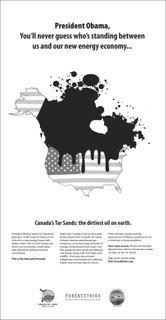Canada vs. America
Obama will make his first international visit as president to Canada, a critical moment for the future of clean energy as Prime Minister Stephen Harper plans to discuss the controversial tar sands oil development. Alberta alone represents the second-largest oil reserve in the world, after Saudi Arabia.
Tar sands production is literally the dirtiest oil in the planet, emitting three times the greenhouse gas emissions as conventional oil and gas production for low quality crude, turning green wilderness to massive pits and bubbling black goop. The impact is evident: By 2015, the tar sands could emit more greenhouse gases than Denmark.
It feels like virtually every environmental group in the country is taking action. Our inbox is flooded with petitions, and there is a coalition composed of fifteen organizations at the very informative Obama2Canada. Forest Ethics even had this extreme (maybe Sherwin Williams inspired) ad in USA Today pictured below. 
It’s hard to play down the negative role of the tar sands. Harper describes it as “an enterprise of epic proportions, akin to the building of the pyramids or China’s Great Wall. Only bigger” and we wrote a pretty mean-spirited post a month ago titled “Crude Awakening.”
In an interview with the Canadian Broadcasting Corporation (CBC) from last night, Obama gave his thoughts on the tar sands and energy at large, citing technology as a solution to fuel tradeoffs. Part of the transcript after the jump:
Q. Part of that trade involves the energy sector, a lot of oil and gas comes to the United States from Canada, and even more in the future with oil sands development. Now there are some in your Canada -- and Canada, as well -- who feel the oil sands is dirty oil because of the extraction process. What do you think; is it dirty oil?
THE PRESIDENT: What we know is that oil sands creates a big carbon footprint. So the dilemma that Canada faces, the United States faces, and China and the entire world faces is how do we obtain the energy that we need to grow our economies in a way that is not rapidly accelerating climate change. That's one of the reasons why the stimulus bill that I'll be signing today contains billions of dollars towards clean energy development.
I think to the extent that Canada and the United States can collaborate on ways that we can sequester carbon, capture greenhouse gases before they're emitted into the atmosphere, that's going to be good for everybody. Because if we don't, then we're going to have a ceiling at some point in terms of our ability to expand our economies and maintain the standard of living that's so important, particularly when you've got countries like China and India that are obviously interested in catching up.
Q. So are you drawing a link, then, in terms of the future of tar sands oil coming into the U.S. contingent on a sense of a continental environment policy on cap and trade?
THE PRESIDENT: Well, I think what I'm suggesting is, is that no country in isolation is going to be able to solve this problem. So Canada, the United States, China, India, the European Union, all of us are going to have to work together in an effective way to figure out how do we balance the imperatives of economic growth with very real concerns about the effect we're having on our planet. And ultimately I think this can be solved by technology.
I think that it is possible for us to create a set of clean energy mechanisms that allow us to use things not just like oil sands, but also coal. The United States is the Saudi Arabia of coal, but we have our own homegrown problems in terms of dealing with a cheap energy source that creates a big carbon footprint.
And so we're not going to be able to deal with any of these issues in isolation. The more that we can develop technologies that tap alternative sources of energy but also contain the environmental damage of fossil fuels, the better off we're going to be.
Q. I know you're looking at it as a global situation, in terms of global partners, but there are some who do argue that this is the time; if there was ever going to be a continental energy policy and a continental environmental policy, this would be it. Would you agree with that thinking?
THE PRESIDENT: Well, you know, I think one of the -- one of the promising areas for not just for bilateral but also trilateral cooperation is around this issue. I met with President Calderón here in the United States, and Mexico actually has taken some of the boldest steps around the issues of alternative energy and carbon reductions of any country out there. And it's very rare for a country that's still involved in developing and trying to raise its standard of living to stay as focused on this issue as President Calderón's administration has.
What I think that offers is the possibility of a template that we can create between Canada, the United States and Mexico that is moving forcefully around these issues. But as I said, it's going to be important for us to make sure that countries like China and India, with enormous populations and huge energy needs, that they are brought into this process, as well.
